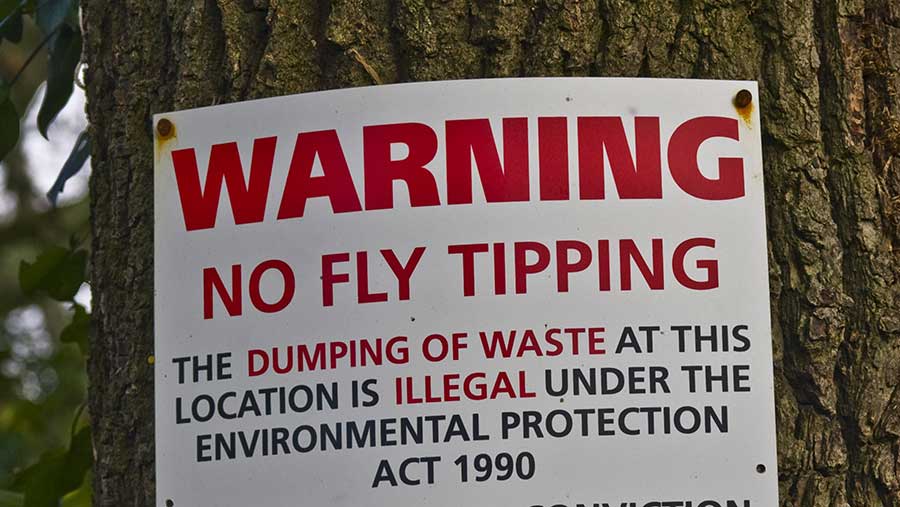Farmers vent frustration over fly-tipping scourge
 © Nicholas and Sherry Lu Aldridge/FLPA / imageBROKER/REX/Shutterstock
© Nicholas and Sherry Lu Aldridge/FLPA / imageBROKER/REX/Shutterstock No criminal convicted of fly-tipping has faced the maximum penalty since the government issued new guidelines five years ago, it has emerged.
The news has angered farmers, who want much tougher sentences for people who dump waste in the countryside.
See also: Video – farms turned into fortresses to tackle rural crime
Fly-tipping incidents have increased by almost 40% since 2012, according to Defra statistics analysed by the Local Government Association (LGA).
The LGA said fly-tipping incidents had rocketed from 714,637 to 997,553 reported cases annually – an increase of more than 280,000 in the past seven years.
But nobody has been slapped with the maximum £50,000 fine or 12-month prison sentence since the government introduced new guidelines in 2014.
‘Losing battle’
Meanwhile, landowners are left footing the bill for removing illegally dumped waste on private land – a problem that affects two-thirds of farmers.
NFU deputy president Guy Smith tweeted photos showing freezers, fridges and a sofa dumped on a private track on Essex farmland.
How very ruddy timely on the day local authorities admit they are losing the fly tipping battle while government think wrongly they have done enough pic.twitter.com/twBoRs2zAZ
— Guy Smith (@essexpeasant) May 11, 2019
Suffolk farmer Jeremy Squirrell tweeted a photo of a caravan left at the side of the road.
Some git dumped this last week on the side of the road @suffolkcc ? pic.twitter.com/KpdIXLuL9q
— Jeremy Squirrell (@Jes_Squirrell) May 12, 2019
The situation was described as “insane” by Nottinghamshire farmer John Charles Jones. He said: “Guidelines need trebling rather than ignoring.”
The LGA said councils were working hard to try to reduce fly-tipping – taking enforcement action on 494,034 incidents in 2017-18, up by nearly 70,000 in five years.
But it said local authorities could not keep up with the spiralling number of cases due to budget cuts, which meant councils in England would face a funding gap of £8bn by 2025.
The LGA wants tougher sentences for the worst offenders – and for the government to ensure councils have the funding needed to investigate and prosecute fly-tippers.
LGA environment chairman Martin Tett said: “Fly-tipping is unsightly, unacceptable and inexcusable environmental vandalism.
‘Budget pressures’
“Councils are doing everything they can to try to deter fly-tippers.
“However, prosecuting them often requires time-consuming and laborious investigations, with a high threshold of proof, at a time when councils face significant budget pressures.”
A Defra spokesperson said: “Fly-tipping is completely unacceptable and combating it remains a priority.
“We have strengthened local authorities’ enforcement powers and made it easier for vehicles suspected of being used for fly-tipping to be stopped, searched and seized.
“Our actions are delivering results, with no increase in the number of incidents over 2017/-8 for the first time in five years. The maximum penalty on indictment for fly-tipping is imprisonment of up to five years or a potentially unlimited fine.”
